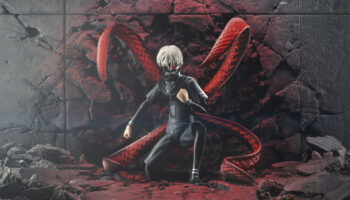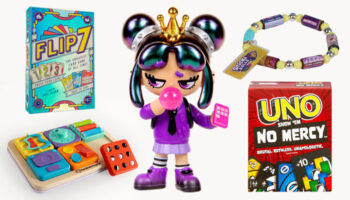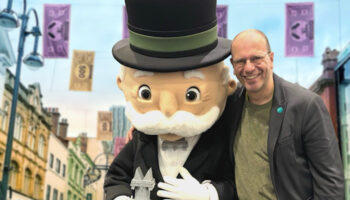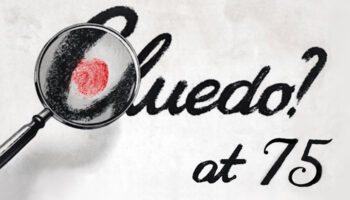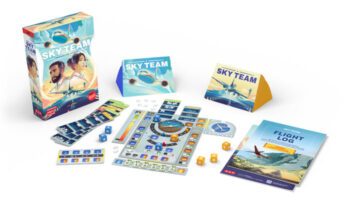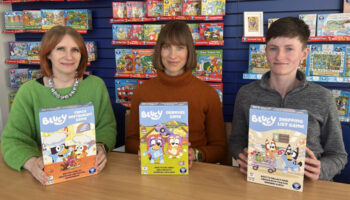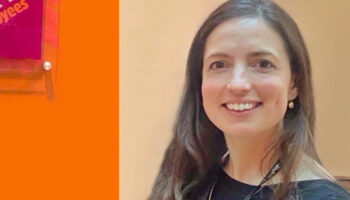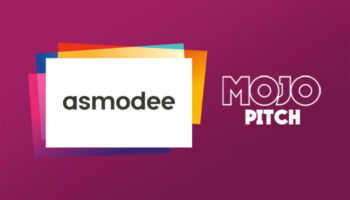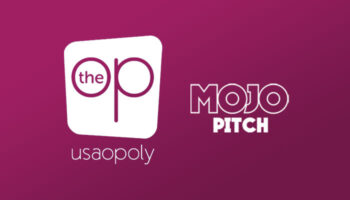“It’s not just a game – it’s a platform for experimentation”: Designers discuss 90 years of Monopoly

As Monopoly celebrates its 90th anniversary, designers and industry figures tell us why they believe it continues to thrive…
Dougal Grimes, Founder, EightyTwo
There are three big reasons why Monopoly has stood the test of time. First, legacy matters – Monopoly has been around for nearly a century, making it one of the first “rules-heavy” board games that families introduce to their kids. It’s been passed down through at least three generations, which means the nostalgia and awareness factor is massive.
Second, iconic design elements. The paper money, the property names, the gameplay mechanics and the mover tokens – I always wanted to be the dog – are so distinct that they’re instantly recognizable.
Third, the theme and name are universally relatable. Buying properties, making deals, and ‘getting rich’ taps into a global archetype of ambition and competition. While entire books could – and have – been written about the psychology of Monopoly, at its core it’s a simple and globally understood concept. And on top of all that, the name itself is a fantastic trademark. It’s short and instantly conveys the gameplay and theme.
One of Monopoly’s biggest reasons for thriving is its ability to reinvent itself, while staying true to its core experience. I was lucky enough to work on the Monopoly team at Hasbro, and one of the most pivotal moments was the National Editions project. The team tapped into fans’ affinity for the properties by launching public votes in different markets to determine which locations would appear on the board. That marketing strategy blended seamlessly with R&D and generated massive PR buzz, leading to a hugely successful launch. This later expanded into the Monopoly World Edition and, eventually, the Token Vote. This insight showed that Monopoly has a framework, making it so malleable.
Every significant aspect of the game offers a creative touchpoint: The money (paper to Electronic banking to App Banking), The tokens ( new characters and pop-culture collaborations), the properties (real-world locations and fantasy worlds), the rules and gameplay (variations like Cheaters Edition). These elements have also made it incredibly easy to extend Monopoly into different categories – digital games, apparel, live experiences, and potentially even film and TV. Because it’s modular in design, Monopoly isn’t just a board game – it’s a platform for experimentation. That’s why you’ll always see new versions launching.

Jim McCafferty, Founder, JMP Creative
Monopoly reminds the older crowd of a simpler, more social time – when friends would gather around a table and dive into marathon Monopoly sessions. No video on demand, no TikTok – just dice, deals and the thrill of trying to bankrupt your buddies. There was always a mini mogul at the table, haggling for Boardwalk, while everyone kept a suspicious eye on the “banker” with sticky fingers.
If someone pitched this game today – with its long play time and clunky mechanics – it’d probably be a tough sell. But Monopoly has grown far beyond its original concept. It now represents the spirit of power, strategy and success, all wrapped in a game night. The faster-paced card versions and all the licensed editions have only helped keep things fresh while deepening the brand’s cultural footprint. It’s not just a game – it’s an experience, and everyone wants a turn at being the tycoon.
I really like the new add-on mechanisms with the expansions – they tweak and enhance the original game while still staying true to its roots. You get new variables and fresh experiences without losing the core Monopoly feel. It’s clever design that extends the life of the game and creates new excitement for people who already have a copy tucked in the closet.
From a business perspective, it’s smart too. Expansions breathe new life into something familiar, and that drives engagement in a big way. Whether it’s Monopoly Knockout, App Banking, or the new expansion packs, they all tap into the same fantasy: channelling your inner real estate mogul. Or, to quote Gordon Gekko: “Greed is good”–and let’s face it, who doesn’t want to dominate the board?

Amanda Birkinshaw, Scott Dean & Richard Heayes, 7pips
Monopoly has been part of the cultural landscape for many years. The beauty of the game – and brand – is that different regions believe it was invented in their country because of the localised nature of the core game. Ask your average person to draw a board game and they will probably create something like Monopoly.
The house icons are used by mortgage companies and the vernacular like ‘Do Not Pass Go!’ or ‘Go to Jail’ often pop up in everyday interaction, constantly reinforcing the brand’s power.
One of the biggest challenges is the time it takes to play the core game. This is due to a good number of people playing it their own way and not the actual rules, like adding fines to pick up on Free Parking and not using auctions when they land on an unclaimed property. In Championship games, most games are wrapped in under an hour. However, despite that, those memories of family and fun become something enduring people want to recreate for themselves as they form new friends and family. It’s a legacy most brands in the world can only dream of.
The challenge with a 90-year-old brand is relevancy and finding new ways to breathe new life into the brand, all while keeping people hooked into core parts of the experience that have kept it a family favourite all these years. 7pips have, between us, designed some of the top selling versions over the years. The original e-banking we created back for the game’s 70th anniversary, followed by products like Monopoly City, Monopoly Empire, Monopoly Cheaters Edition – and not forgetting the great card game, Monopoly Deal.
Is Monopoly the best game in the world? No, but that’s not the point. It’s a game that for many might be their first family board game and, in turn, is a gateway to an expansive world of tabletop games.

Matt Nuccio, President, Design Edge
Just a few short years ago, Design Edge had the privilege of designing and developing Monopoly: Spider-Man for Hasbro. It was a fascinating project that allowed us to dive deep into what makes Monopoly not only a beloved board game but arguably the quintessential American game. I spent months reflecting on its enduring appeal and considering what has made Monopoly a true cultural phenomenon for generations.
Monopoly is much more than just a classic board game. It’s a juggernaut because it has the remarkable ability to stay relevant and exciting year after year. Whether through licensing partnerships, themed editions, or variations in gameplay, the game constantly reinvents itself to engage new audiences while retaining its core appeal. This adaptability is what keeps Monopoly fresh, no matter how many new versions or spin-offs come along.
It’s not just the gameplay itself that turns family game nights into lifelong grudges; it’s the experience of navigating the game’s highs and lows. Monopoly mirrors the unpredictability of life – one minute you’re on top of the world, buying up properties and feeling unstoppable; the next, you’re in jail with nothing but the clothes on your back, desperately trying to avoid bankruptcy. And let’s not forget the thrill of wielding a ‘Get Out of Jail Free’ card like a secret weapon, offering a sweet escape from the chaos. This mix of strategy, luck, and social dynamics is what keeps players coming back for more.

Josh West, Head of Product Design and Inventor Relations, ThinkFun
In a weird, abstract way, Monopoly is a very straightforward role-playing game. Lizzie Magie originally intended the game to teach something of a moral lesson about attaining wealth, but one of the main reasons the game caught on was that people found it fun to step into the role of someone wealthy – with the ability to buy and sell property, improve it, make an exorbitant amount of (play) money, or else wind up a pauper (also play, thankfully). You can step into the role of real estate speculator without really risking anything.
On some level, I think almost everyone enjoys this as a fantasy – and for a long time it was one of the favourite ones to have, especially through some of the most challenging periods in the US’ history. For many, especially in those early generations, that was the classic “American Dream” – start with what you have, work hard (and smart), and become Rockefeller. And of course, like any good RPG, if the rules were too much, there were myriad home-brewed variations you could use!
And there’s so much to work with in Monopoly’s tabletop world of high-finance and investment. It started mostly as property investing, but has included stocks, credit… Lots of aspects of money-making. It’s also evolved as people have handled money differently. Really, Hasbro could take any way that people use or make money, work it into a Monopoly game or game variant, and it would have an audience that could relate to it. That’s a pretty solid platform from which to market a game.

Steve Reece, MD, Kids Brand Insight
20 years ago, I was European Brand Manager of Monopoly for a while. The fact that Monopoly survived my erratic ‘stewardship’ surely proves it can survive anything! More seriously, Monopoly has three primary features which make it a perennial classic:
Parents have a rosy nostalgic view of Monopoly and want to introduce it to their kids.
They already know the gameplay and teach their kids without having to get through the instructions learning curve.
The theme is timeless – money and buying houses resonated when the game launched during the great depression, and still resonates today.
Monopoly has also proven to be the ultimate games brand for brand extensions. From a design perspective, Monopoly in the traditional board game format is, in essence, a square board with spaces to land on and properties to buy. You can therefore overlay nearly any location, theme, organisation or licensed brand, hence the fact there have been so many versions.
The strength of the brand is what allows it to be ‘ported’ into different play formats beyond a standard board game. As long as you keep the Monopoly logo and some key brand icons, you can turn that into any other format of either non-digital or fully digital game. The other important point is that Monopoly is for everyone, and so you can keep on extending and shaking up the gameplay to make it relevant for new audiences.

Westley Ciaramella, Partner, Catapult Concepts
Monopoly is engrained as a classic family game night brand. From McDonald’s to casinos, you can find Mr Monopoly… Any game mechanic with Monopoly on it is a friendly self-advertised win!

Robert Fuhrer, Owner and Founder, Nextoy
I think part of Monopoly’s enduring success – and malleability – is that the gameboard and property names are just placeholders and can be swapped out for other themes – from cities to movies and more. It means the gameplay doesn’t change, but the marketing expands. Also, users feel some ownership of the game, frequently modifying the rules, whether to shorten the play or add elements.
–
To stay in the loop with the latest news, interviews and features from the world of toy and game design, sign up to our weekly newsletter here





